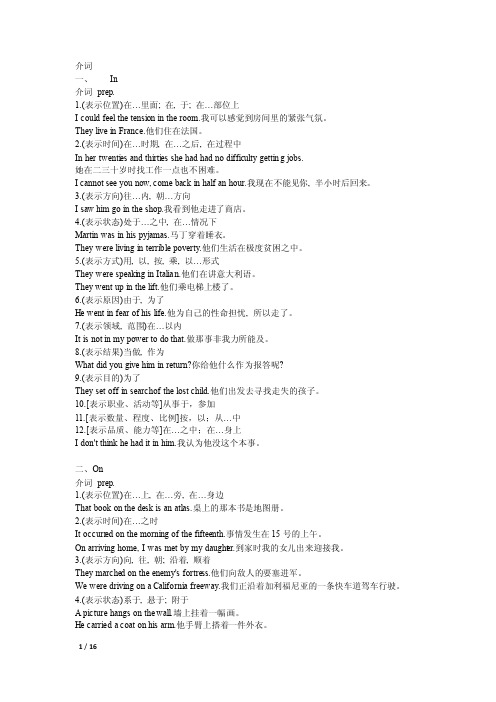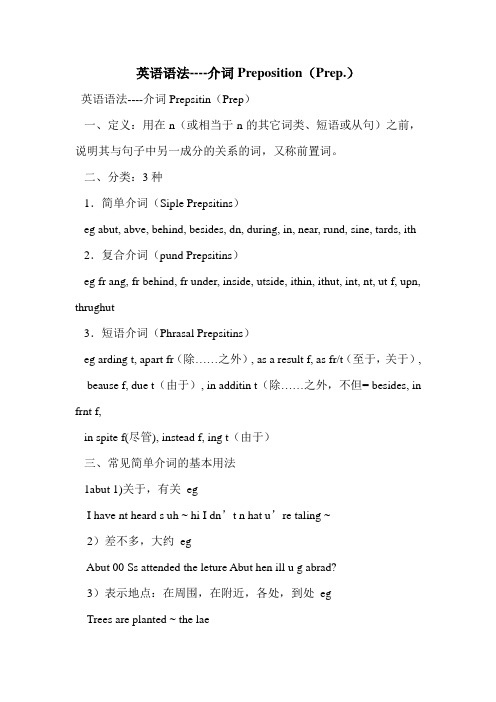prep.用法
prep除之外

if
• if 引导的条件状语从句,主句用一般将来 引导的条件状语从句, 时,从句用一般现在时。 • If you do, the teachers will take it away. • If you do, the teachers will ask them to leave. • If you do, the teachers will call your parents. • If you do, you’ll have to leave.
Review of units 1-5
By Mr. Wang April 11, 2005
besides
1) prep.除...之外 prep.除...之外
He had few friends besides us. 除我们之外他没有什 么朋友。 么朋友。 Besides milk and cheese, we need vegetables. 除了牛奶和干酪外,我们还需要蔬菜。 除了牛奶和干酪外,我们还需要蔬菜。
so that VS so… that…
• so that 以便; 以便;致使 • Please study hard so that you can pass the final exam. • 努力学习,这样你就可以通过期末考试。 努力学习,这样你就可以通过期末考试。 • so …that … 如此…以致于 以致于… 如此 以致于 He is so young that he can’t join the army. 他太年轻了,还不能参军。 他太年轻了,还不能参军。 • He is too young to join the army. • 他太年轻了,还不能参军。 他太年轻了,还不能参军。
prefer
考研-常见介词用法总结

介词一、In介词prep.1.(表示位置)在…里面; 在, 于; 在…部位上I could feel the tension in the room.我可以感觉到房间里的紧张气氛。
They live in France.他们住在法国。
2.(表示时间)在…时期, 在…之后, 在过程中In her twentie s and thirtie s she had had no difficu lty getting jobs.她在二三十岁时找工作一点也不困难。
I cannotsee you now, come back in half an hour.我现在不能见你, 半小时后回来。
3.(表示方向)往…内, 朝…方向I saw him go in the shop.我看到他走进了商店。
4.(表示状态)处于…之中, 在…情况下Martinwas in his pyjamas.马丁穿着睡衣。
They were livingin terribl e poverty.他们生活在极度贫困之中。
5.(表示方式)用, 以, 按, 乘, 以…形式They were speakin g in Italian.他们在讲意大利语。
They went up in the lift.他们乘电梯上楼了。
6.(表示原因)由于, 为了He went in fear of his life.他为自己的性命担忧, 所以走了。
7.(表示领域, 范围)在…以内It is not in my power to do that.做那事非我力所能及。
8.(表示结果)当做, 作为What did you give him in return?你给他什么作为报答呢?9.(表示目的)为了They set off in searchof the lost child.他们出发去寻找走失的孩子。
英语语法----介词Preposition(Prep.)

英语语法----介词Preposition(Prep.)英语语法----介词Prepsitin(Prep)一、定义:用在n(或相当于n的其它词类、短语或从句)之前,说明其与句子中另一成分的关系的词,又称前置词。
二、分类:3种1.简单介词(Siple Prepsitins)eg abut, abve, behind, besides, dn, during, in, near, rund, sine, tards, ith 2.复合介词(pund Prepsitins)eg fr ang, fr behind, fr under, inside, utside, ithin, ithut, int, nt, ut f, upn, thrughut3.短语介词(Phrasal Prepsitins)eg arding t, apart fr(除……之外), as a result f, as fr/t(至于,关于), beause f, due t(由于), in additin t(除……之外,不但= besides, in frnt f,in spite f(尽管), instead f, ing t(由于)三、常见简单介词的基本用法1abut 1)关于,有关egI have nt heard s uh ~ hi I dn’t n hat u’re taling ~2)差不多,大约egAbut 00 Ss attended the leture Abut hen ill u g abrad?3)表示地点:在周围,在附近,各处,到处egTrees are planted ~ the laeThe live sehere~ the Peple’s SquareDn’t leave ur bs~ ur des I haven’t an sall hange ~/n e 4)“即将”(近期将)egThe fil is ~ t begin It’s nearl 7:00 The train is ~ t leave2abve 1)在……上方egA bird is fling abve the ds There is a prtrait abve the blabard 2)(在数量上)超过egThe an is nt et frt, but ell ~thirtThe nuber f ne Ss this ear is ~fur hundred3)(能力等)胜过,超越;因太困难、太好而不…… eg The prble is ~ e (这问题太难我不懂。
小胖子prep语法笔记

目录一比较 (3)二时态 (11)三指代 (13)四省略 (20)五独立主格 (21)六同位语 (23)七分词 (24)八并列 (28)九句子及其它成分 (29)9.1Run-on sentence连写句 (29)9.2There be (30)9.3冠词 (30)9.4句子完整结构 (31)9.5夹心修饰 (31)9.6Redundancy word list (32)9.7嵌入式关系分句 (32)9.8不定式 (33)9.9As & When 引导的状语从句 (33)9.10倒装大全,大爱总结大全 (34)9.11列举 (35)十定语从句 (36)十一虚拟语气 (38)十二重点词组的用法 (39)12.1Except (40)12.2Require (41)12.3Number 用法 (41)12.4While 的用法 (44)12.5Date to/ at (44)12.6Intend (45)12.7Help (46)12.9Expect (46)12.10Due to (47)12.11Tend (47)12.12Bother (48)12.13Support (48)12.14unqualified & unqualifying (48)12.15Plan (48)12.16After (48)12.17Prohibit (49)12.18Neither (49)12.19As (49)12.20to 和in order to (49)12.21表原因 (50)12.22Reach (50)12.23to do for doing (50)12.24时间状语 (51)12.25Capability & Ability (51)12.26Especially & specially (51)12.27Need (51)12.28Whether or not (51)12.29介词加that (52)12.30Estimate (52)12.31Conclude (52)12.32Be known (52)12.33Design 固定搭配 (53)12.34according to 与in accordance with (53)12.35Inhabit (53)12.36Method (53)12.37So & As (54)12.38With & By (54)12.39Conceive (54)12.40Other than (54)12.41介词词组 (54)12.42Attempt (55)12.43Despite (55)12.44Amount (55)12.45As many (55)12.46Extend (56)12.47不能接被动语态的动词或短语 (56)12.48Announce (56)12.49Because of 与account of (56)12.50Limit (57)12.51Through & by (57)12.53Efficient (57)12.54Namely (58)12.55With (58)12.56Make & allow (58)12.57Ensure的固定搭配 (59)一比较1.词组:less/fewer than X percent of Y,less或fewer的选用取决于Y是否可数,本题的比较对象是drive-ins。
英语语法----介词Preposition(Prep.)

英语语法----介词Preposition(Prep.)英语语法----介词Prepsitin(Prep)一、定义:用在n(或相当于n的其它词类、短语或从句)之前,说明其与句子中另一成分的关系的词,又称前置词。
二、分类:3种1.简单介词(Siple Prepsitins)eg abut, abve, behind, besides, dn, during, in, near, rund, sine, tards, ith 2.复合介词(pund Prepsitins)eg fr ang, fr behind, fr under, inside, utside, ithin, ithut, int, nt, ut f, upn, thrughut3.短语介词(Phrasal Prepsitins)eg arding t, apart fr(除……之外), as a result f, as fr/t(至于,关于), beause f, due t(由于), in additin t(除……之外,不但= besides, in frnt f,in spite f(尽管), instead f, ing t(由于)三、常见简单介词的基本用法1abut 1)关于,有关egI have nt heard s uh ~ hi I dn’t n hat u’re taling ~2)差不多,大约egAbut 00 Ss attended the leture Abut hen ill u g abrad?3)表示地点:在周围,在附近,各处,到处egTrees are planted ~ the laeThe live sehere~ the Peple’s SquareDn’t leave ur bs~ ur des I haven’t an sall hange ~/n e 4)“即将”(近期将)egThe fil is ~ t begin It’s nearl 7:00 The train is ~ t leave2abve 1)在……上方egA bird is fling abve the ds There is a prtrait abve the blabard 2)(在数量上)超过egThe an is nt et frt, but ell ~thirtThe nuber f ne Ss this ear is ~fur hundred3)(能力等)胜过,超越;因太困难、太好而不…… eg The prble is ~ e (这问题太难我不懂。
prep语法

对于比较结构中是否有必要补充助动词,应以是否会产生歧意为标准.如果不会产生歧意,则可以不补出助动词,如果会产生歧意,一定要补出助动词.51. (27205-!-item-!-188;#058&003142)Gasoline marketing is undergoing major changes as stations often not only add convenience storesbut also combine with major fast-food chains to build complexes where customers can shop andeat as well as buy gasoline.(A) not only add convenience stores but also combine with major fast-food chains to build(B) not only add convenience stores but also they combine with major fast-food chains to build(C) are not only adding convenience stores but also in combination with major fast-food chains they build(D) add not only convenience stores, but also combining with major fast-food chains to build(E) are not only adding convenience stores, but also in combining with major fast-food chains theybuild考点:平行对称(Parallelism)1) not only… but also结构要平行(A) 正确,(B) they破坏了not only… but also的平行结构,应该去掉(C) not only…but also结构不平行;they build…与前面句子不连贯,句子结构错误。
prep.
Preposition
介词 ( preposition )
一 介词的分类与语法功能 1.介词是虚词, 不能单独做句子成分, 必须与名词、 代词( 或相当于名词的其他词类、短语、或从句 ) 构成介词短语,在句子中充当一个成分。 介词分为: 简单介词: at 、 in 、 on 、for 、 to 合成介词: within 、 inside 、 onto、 throughout . 短语介词: according to 、 out of 、 because of、 by means of、 in spite of 、 instead of
by Eggs are sold ______ the dozen.
九、in the end, at the end of, by the end of: in the end作“最后”、“终于”解,可单独使用, 后不接介词of; at the end of 表示“在……末梢”,“到……尽 头”,既可指时间,也可以指地上或物体。不 可单独使用; by the end of 作“在……结束时”,“到……末 为止”解,只能指时间。不可单独使用。 如:In the end they reached a place of safety. At the end of the road stands a beautiful garden. They decided to have an English evening at the end of this week. By the end of last month he had finished the novel.
between He divided the sweets ____________ L Nl, L Cl and Y Mh.
prep语法
对于比较结构中是否有必要补充助动词,应以是否会产生歧意为标准.如果不会产生歧意,则可以不补出助动词,如果会产生歧意,一定要补出助动词.51. (27205-!-item-!-188;#058&003142)Gasoline marketing is undergoing major changes as stations often not only add convenience storesbut also combine with major fast-food chains to build complexes where customers can shop andeat as well as buy gasoline.(A) not only add convenience stores but also combine with major fast-food chains to build(B) not only add convenience stores but also they combine with major fast-food chains to build(C) are not only adding convenience stores but also in combination with major fast-food chains they build(D) add not only convenience stores, but also combining with major fast-food chains to build(E) are not only adding convenience stores, but also in combining with major fast-food chains theybuild考点:平行对称(Parallelism)1) not only… but also结构要平行(A) 正确,(B) they破坏了not only… but also的平行结构,应该去掉(C) not only…but also结构不平行;they build…与前面句子不连贯,句子结构错误。
as的用法归纳总结
as的用法(1)prep.介词1.像;如同. e.g.They were all dressed as clowns.2.作为;当作. e.g.I respect him as a doctor.(2)adv.副词 e.g.You can use that glass as a vase.1.as...as...像...一样,如同,和...一样e.g.I have not know him as long as you.(3)conj.连词1.当...时 e.g.As she grew older she gained in confidence.2.照...方式 e.g.They did as I had asked.3.因为,由于 e.g.As you were out,I left a message.4.正如,如同 e.g. as you know5.虽然,尽管 e.g.Happy as there were, there was something missing.(此类型倒装句可用于作文中)(4)IDM. 短语1.as you do (对刚才说的话的评论)e.g.He smiled and I smiled. As you do. 他微笑,我也微笑。
正所谓礼尚往来。
2.as it were可以说,在一定程度上.e.g.Teachers must put the brakes on,as it were,when they notice students looking puzzled.当老师发现学生神色茫然时,就应该在一定程度上放慢速度3.as it is照现状.e.g.We were hoping to finish it by next week-as it is,it may be the week after.4.as from.../as of...自...起e.g.Our fax number is changing as from May 12.5.as for ...至于6.as against 和...相比较,与...相对照7.as and when将来...时e.g.I will tell you more as and when.我一有可能就告诉你更多情况.112016.4.23 宁203。
介词用法大全
介词用法大全介词preposition缩写prep.,又叫前置词,表示其后的名词或代词(或是相当于名词的其他短语或从句)与其他句子成分的关系。
介词是一种虚词,不能单独在句中作成分。
口诀1:年月周前要用in,日子前面却不行。
遇到几号要用on,上午下午又是in。
要说某日上下午,用on换in才能行。
午夜黄昏用at,黎明用它也不借。
at也在时分前,说“差”用to,说“过”要用part。
口诀2:in在……里,out在……外,在旁边的是XXX,靠近的为by。
on在……上,under在……下,above在上头,below在底下。
介词preposition缩写prep.,又叫前置词,表示其后的名词或代词(或是相当于名词的其他短语或从句)与其他句子成分的关系。
介词是一种虚词,不能单独在句中作成分。
介词的用法1、表示时间的(at、on、in、at、before,after、by、until、through、from、since、within)(1)at:用于表示时刻,时间的某一点。
XXX在中午XXX在夜间XXX目前(2)on:用于星期,某天,某一天的上午、下午、晚上(指具体的某一天时,一律用) onsunday在星期天XXX在星期天的上午on march 8在3月8日(3)in:用于透露表现周、月、季候、年、泛指上午、下午、清晨。
in 1999在1999年XXX在11月份in summer在夏季in XXX在下午i think he will be back in an hour。
我想他一小时后就会回来。
i heard that she would be back in a month.我听说她一个月后回来的。
by the time i arrived,she had already gone。
在我到达之前,她已经走了。
XXX-four hours without rest。
XXX常常工作24小时而不休息。
during the lifetime of one man,XXX。
- 1、下载文档前请自行甄别文档内容的完整性,平台不提供额外的编辑、内容补充、找答案等附加服务。
- 2、"仅部分预览"的文档,不可在线预览部分如存在完整性等问题,可反馈申请退款(可完整预览的文档不适用该条件!)。
- 3、如文档侵犯您的权益,请联系客服反馈,我们会尽快为您处理(人工客服工作时间:9:00-18:30)。
一.代词代词是代替名词或起名词作用的短语、分句和句子的词。
代词分为人称代词、物主代词、反身代词、相互代词、指示代词、疑问代词、关系代词、连接代词和不定代词等。
本章要求学员掌握多种代词的形式和用法,特别是人称代词、物主代词、疑问代词、关系代词和不定代词。
注意all ,every,each 的区别;any,some的区别;every-body,evreone,one的区别;no one,none的区别;both,two第比较;other,another的比较。
二.冠词冠词的分类冠词分为不定冠词"a,an"、定冠词"the"和零冠词三种,零冠词指的是不用冠词的情况。
不定冠词表示泛指,定冠词表示特指。
不定冠词的用法不定冠词有"a和an"两种形式。
"a"用在以辅音开头的词前,"an"用在以元音开头的词前。
判断一个词是以元音开头还是以辅音开头,是根据读音而不是根据字母。
1. 用于可数名词的单数形式前,表示"一"There is a tiger in the zoo.动物园里有一只老虎。
2. 表示一类人和东西A tiger can be dangerous.老虎可能有危害性。
3. 表示"某一个"的意思A gentleman wants to see you.有一位先生要见你。
4. 表示"同一"的意思They are nearly of an age.他们几乎同岁。
The two shirts are much of a size.这两件衬衫大小差不多。
5. 表示"每一"的意思We go swimming four times a week.我们每周去游泳四次。
6. 用在作表语的单数可数名词前,表示身份、职业My mother is a teacher.我妈妈是教师。
7. 第一次提到的人或事物,但不特别指明是哪一个Long long ago there was an old king who had a very beautiful daughter.很久很久以前,有一个年老的国王,他有一个非常美丽的女儿。
8. 在英国英语中,以"h"开头的多音节词,如第一个音节不重读,其前亦可用"an" There is a hotel near here.这附近有一家旅馆。
9. 在such a,quite a句式中He is quite a good actor.他是一个相当好的演员。
Don't be in such a hurry.不要如此匆忙。
10. 在感叹句what...的句式中What a pretty girl she is!她是一个多么漂亮的女孩呀!用在某些表示数量的词组中:a lot of 许多a couple of 一对a great many 很多a dozen 一打(但也可以用one dozen)a great deal of 大量定冠词的用法1. 用以特指某(些)人或某(些)事物This is the house where Luxun once lived.这是鲁迅曾经住过的房子。
2. 用于指谈话双方都明确所指的人或事物Open the door, please.请把门打开。
3. 用以复述上文提过的人或事物(第一次提到用“a或an”,以后再次提到用“the”)Once there lived a lion in the forest. Every day the lion asked small animals to look for food for him.从前森林里住着一只狮子。
每天这只狮子要小动物们为他寻找食物。
4. 用在序数词和形容词最高级前January is the first month of the year.一月份是一年当中的第一个月。
Shanghai is the biggest city in China.上海是中国最大的城市。
5. 表示世界上宇宙中独一无二的事物the sun 太阳the moon 月亮the earth 地球the sky 天空the world 世界6. 指由普通名词构成的专有名词the West Lake 西湖the Great Wall 长城the United States 美国the United Nations 联合国定冠词的用法-27. 表示方向、方位in the east 在东方in the west 在西方in the front 在前面at the back 在后面in the bottom 在底部at the top 在顶部on the right 在右边on the left 在左边8. 在海洋、江河、湖泊、山脉、海峡、海湾等地理名词前the Pacific Ocean 太平洋the Huanghe River 黄河the Tainshan Mountains 天山山脉the Taiwan Straits 台湾海峡9. 在姓氏复数前,表示一家人The Bakers came to see me yesterday.贝克一家人昨天来看我。
10. 和某些形容词连用,使形容词名词化,代表一类人或物the poor 穷人the rich 富人the sick 病人the wounded 伤员the good 好人the beautiful 美丽的事物11. 用在表示阶级、政党的名词前the working class 工人阶级the Chinese Communist Party 中国共产党12. 用在the very强调句中This is the very book I want.这就是我想要的那本书。
13. 在the more, the more比较级的句式中The more you drink, the more you like it.你越喝就越爱喝。
14. 表示演奏乐器时,乐器的前面要加theplay the piano 弹钢琴play the violin 拉小提琴[中国乐器名词前不与冠词连用:plya erhu(二胡)]15. 某些固定的表达法in the morning 在早上in the afternoon 在下午in the evening 在晚上go to the cinema 去看电影go to the theatre 去看戏all the year round 一年到头on the way to 前往...去的路上16. the加单数可数名词可以表示一类人或事物The horse is a useful animal.马是一种有用的动物。
注意:像这类句子还有如下两种写法A horse is a useful animal.Horses are useful animals.17.在句型“动词+sb.+介词+the+身体某一部位”中要用the,而不用人称代词。
take sb. by the arm 抓住某人的手臂hit sb. in theface 打某人的脸be red in the face 脸红be lame in theright leg 右腿瘸等结构中,名词前要用the零冠词的用法1. 专有名词前一般不加冠词China 中国Europe 欧洲Lei Feng 雷锋William Shakespeare 威廉·莎士比亚2. 月份、周日、节日前一般不加冠词January 一月份Sunday 星期日Christmas Day 圣诞节Thanksgiving 感恩节National Day 国庆节May Day 劳动节比较: ...on a Sunday morning.在一个星期天的早晨... (表示某一个。
)注:民族节日前要加the 如:the Spring Festival3. 三餐、四季前一般不加冠词I have lunch at school.我在学校吃午餐。
Summer is the best season for swimming.夏天是游泳的好季节。
比较:I had a big lunch yesterday.昨天我吃了一顿丰盛的午餐。
(表示某一个)The dinner given by Mr Smith was very nice.史密斯先生款待的晚宴真是美味。
(表示特指)比较:I will never forget the summer we spent in Hawaii.我永远不会忘记我们一起在夏威夷度过的那个夏天。
(表示特指)4. 进行球类运动play basketball 打篮球play volleyball 打排球play football 踢足球5. 没有特指的物质名词This cart is made of wood.这辆手推车是用木头作的。
比较:The wood outside was all wet.外面的那些木头都湿了。
(表示特指)6. 没有特指的不可数抽象名词Time is precious.时间是宝贵的。
比较:The time of the play was 1990s.这个剧本的时代背景是二十世纪九十年代。
(表示特指)7. 没有特指的可数名词复数形式后。
I like tomatoes.我喜欢西红柿。
8. 山峰Mount Qomolangma 珠穆朗玛峰9. 固定词组go to school 去上学go to bed 上床睡觉go by train 乘火车去go by boat 乘船去at table 在用餐in hospital 住院at school 求学in school 求学at noon 在中午at night 在晚上at midnight 在半夜in town 在城里10. 独立结构中的名词不加冠词A boy came in, book in hand.一个男孩进来,手上拿着书。
11. 泛指人类Man is mortal.人必有一死。
12. 在"kind of+名词sort of+名词"句式中What kind of flower is it?这是什么花?I like this sort of book.我喜欢这种书。
13. 指职位、头衔的词,如king,captain,president,chairman 等。
He is (the) captain of the team.他是球队的队长。
As (the) chairman of the committee, I declare the meeting open.作为委员会主席,我宣布会议开始。
